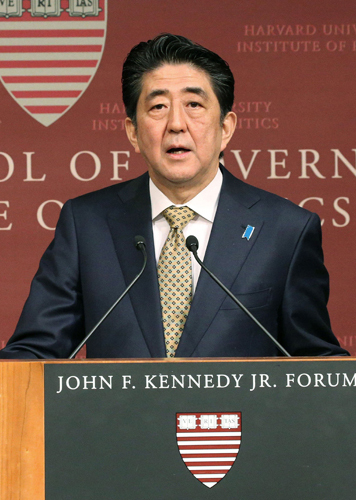Japanese Prime Minister Shinzo Abe offered no clear apology Monday for Japan's wartime sexual enslavement of Korean and other Asian women, sticking to a previous vague statement on the issue that has stymied Tokyo's relations with Seoul.
"When it comes to the comfort women issue, my heart aches when I think about those people who were victimized by human trafficking and who were subject to immeasurable pain and suffering beyond description," Abe said during a visit to Harvard University in Boston.
The remark was almost identical to what he said during an interview with The Washington Post last month that apparently was carefully calculated not to deviate from his administration's existing position not to unequivocally acknowledge Japan's responsibility for the atrocity.
Critics have said Japan should issue a clearer apology as the perpetrator.

The selection of the term "human trafficking," instead of sexual slavery, was also seen as an attempt to evade Japan's responsibility because the term is usually associated in South Korea and some other Asian nations with private prostitution.
Monday's remark bodes ill for the prospect of a clear apology from Abe when he addresses the U.S. Congress.
"Several times in the past, I have had the occasion to mention that I will uphold the Kono Statement. From such a standpoint, Japan has made various efforts from the perspective of offering realistic relief for the comfort women," Abe said, referring to a 1993 statement of apology for the crime.
"In the 20th century, we have seen a history where once conflict arises, women's human rights and honor are deeply wounded. We had such a history. In the 21st century, we should not make this history which is akin to the 20th century," he said.
Abe also said Japan will work harder to promote women's rights.
Asked about what Japan can do to reduce tensions in the Asia-Pacific region, Abe only mentioned "deep remorse" about World War II and said Japan will make efforts to improve ties with South Korea and China.
Outside the auditorium, dozens of students and other protesters, including one surviving sexual slavery victim, Lee Yong-soo, held a rally, lining a road leading to the auditorium's main entrance and forcing Abe to use a back door to get into the building.
Protesters held such signs as "Abe, stop denying! Unequivocal apology now!" "Heartache is not an apology," "Justice for survivors," "Your denial is killing them twice." Lee, the victim, was sitting in a wheelchair holding a sign that read, "I am a survivor of Japanese military sexual slavery."
"The prime minister of a country should use the main entrance with his head held high if he didn't do anything wrong," Lee said. "Abe, what are you so afraid of?"
Historians estimate that up to 200,000 women, mainly from Korea, which was a Japanese colony from 1910 to 1945, were forced to work in front-line brothels for Japanese soldiers during World War II. But Japan has long attempted to whitewash the atrocity.
The sexual slavery issue has been the biggest thorn in frayed relations between Japan and South Korea, with Seoul demanding Tokyo take steps to address the grievances of elderly Korean victims of the atrocity and Japan refusing to do so.
Abe arrived in Boston on Sunday, kicking off a weeklong visit to the U.S. seen as a celebration of the ever-growing security and economic partnerships between Tokyo and Washington. U.S. Secretary of State John Kerry hosted a dinner for Abe on Sunday.
Later Monday, Abe flew to Washington for summit talks with President Barack Obama, set for Tuesday, and an address before a joint session of Congress on Wednesday.
In a surprise appearance, Obama joined Abe in an unannounced visit to the Lincoln Memorial in central Washington. Photos showed the two leaders walking side by side up the stairs to the statue of the former U.S. president and talking to each other
Abe also paid a visit to Arlington National Cemetery and the Holocaust Memorial Museum.
The congressional speech, set for Wednesday, will be the first of its kind for a Japanese prime minister and symbolizes the grand welcome the U.S. is throwing for a leader who has helped address U.S. security and economic needs in a region marked by China's rise
Critics say Abe is unworthy of the privilege because he has attempted to whitewash Japan's militaristic past and wartime atrocities, especially the sexual slavery, refusing to acknowledge the country's responsibility and compensate victims.
In the runup to the visit, pressure mounted on Abe to resolve history tensions, with a bipartisan group of 25 congressmen sending a joint letter urging him to address history issues, as well as mainstream U.S. media, including The New York Times, saying the success of Abe's visit depends on how honestly he confronts Japan's wartime history.
Despite such pressure, however, widespread indications are that Abe is unlikely to offer a sincere apology for the wartime atrocities, including the sexual slavery issue, which would mean that Seoul-Tokyo relations won't get better any time soon. (Yonhap)




![[Herald Interview] 'Amid aging population, Korea to invite more young professionals from overseas'](http://res.heraldm.com/phpwas/restmb_idxmake.php?idx=644&simg=/content/image/2024/04/24/20240424050844_0.jpg&u=20240424200058)












![[KH Explains] Korean shipbuilding stocks rally: Real growth or bubble?](http://res.heraldm.com/phpwas/restmb_idxmake.php?idx=652&simg=/content/image/2024/04/25/20240425050656_0.jpg&u=)

